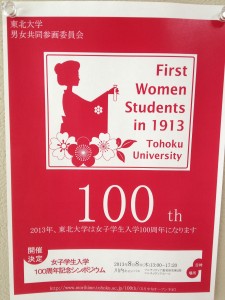blogging expectations life in Japan personal university
by sendaiben
4 comments
Women in Japan
I just saw this poster in my building commemorating the fact that 100 years ago in 1913, Tohoku University was the first university in Japan to admit women as students. I didn’t know that, and I am quite pleased to be working at such a progressive place (here’s hoping they’ll be progressive enough to allow me to stay on past my initial contract LOL).
This is interesting to me in two ways:
1) has women’s place in Japanese society really improved all that much in 100 years?
2) is society going to facilitate women working in the future?
It always struck me as strange that there are such structural and societal limitations on women in a democracy where they make up more than half of the electorate… but I have come to realize that a lot of the obstacles working women in Japan face come from societal expectations, often voiced by other women. Japan seems to be one of the last holdouts of the housewife mother, to an extent that I haven’t seen in Europe of the US. Specifically, I am thinking about how volunteer and community groups (like PTAs, chounaikai, sports team parent groups, etc.) make no efforts to cut working mothers any slack. If anything, they seem to pick on them, at least in my limited experience.
At the same time you get politicians making asinine comments like this and you wonder if things are going to change in the future?
Looking at Japan’s demographic future (the government projects an aging population of less than 100 million by 2050), and lack of plans for mass immigration (this is the government’s focus at the moment, but I can’t see many people applying), women seem to be the economy’s last shot…
And yet women seem to have expectations of men that are becoming increasingly unrealistic, at least according to the small sample in the link. This has been mooted as one of the main contributing factors to the low birth rate -after all, if you don’t have enough money to get married, you probably aren’t going to be having children either (or at least one would hope so).
What do you think? Is Japanese society supportive of women choosing what to do in life? Can you see it changing in the future?
EFL eikaiwa ES extensive listening extensive reading kids language courses Language learning materials online resources oxford owl Oxford Reading Tree Reading self-study websites young learners
by sendaiben
leave a comment
Oxford Owl website
This is another post I have been meaning to write for a while. Oxford Owl is a free website created by Oxford University Press. It has a range of useful resources -I’ll briefly list a few here.
The website has reading and maths sections. I haven’t done much with the maths so far.
The reading section has a range of free ebooks from the Oxford Reading Tree series. Most of the books can be read online, and feature the art, text, and audio. This is a wonderful resource for self-study at home or in the classroom.
There are also a couple of online games and a range of printable resources for students.
Finally, there is a lot of advice for teachers and parents on how to teach reading and support students with reading practice. Although much of this is aimed at native speakers, a lot of it transfers quite well to EFL.
Is anybody using Oxford Owl? Any good features I have missed? Please leave a comment below:
business curriculum eikaiwa extensive listening extensive reading language courses materials school management self-study teaching technology university
by sendaiben
10 comments
Self-access centres in private language schools
I have always wanted to have some kind of self-access centre (room?) at Cambridge English. I feel it would offer a lot of value to some students, as well as make what we do more effective.
The room would have books, computers, and comfortable chairs. It would have nice lighting and be a quiet, pleasant place.
Students would come and use the room whenever they wanted, and regular classes would also include self-study time (students would have to spend 30-60 minutes of a 90- or 120-minute class doing self-study).
We may have the chance to create something like this this year as our current classroom is too small and there is very little real estate available in Sendai after the 2011 disaster so we have rented an apartment above the school to have classes in.
I would like to do something like this at university as well. For now, I think the best chance is to work with the library.
Does anyone have any experience of implementing this kind of system?
(photo is the Self-Access Centre at Kanda University)
EFL ES expectations high school junior high school kids online resources teaching TED university
by sendaiben
2 comments
Every Kid Needs a Champion -what a great TED talk
I saw a fantastic TED talk the other day, and wanted to share it with you. I think it is very applicable to all teachers, including eikaiwa and university.
I would love to be half as inspiring as this woman.
ALTs business ES expectations high school junior high school public policy teaching
by sendaiben
5 comments
If I ruled the world… the JET Programme
So the story I wrote about yesterday seems to have caught the eye and the imagination of people I know. I have yet to see a positive response, even among former JETs.
There are various reasons for that, but the most important one seems to be the opportunity cost of this plan -there are probably much more effective things that could be done with the money. I’d like to put all that aside and just focus on what could be done to make the JET Programme and wider ALT utilization more effective.
1. Make JET an up or out program
Almost all ALTs are excited, happy, enthusiastic, and motivated when they first arrive in Japan. That energy and enthusiasm, combined with not knowing anything about Japan, is hugely beneficial for students. However, after a year, depending on how their year has gone, how they have been treated by teachers and schools, and how their particular ALT community is, they will change. Some will pick up bad habits and stagnate in the computer room, some will settle into a comfortable existence, and some will learn as much as they can about teaching and work hard to improve themselves.
At that point I believe most ALTs should move on. JET is, as many have mentioned, an exchange program, a way for Japan to increase its soft power, and a way to internationalize smaller and out of the way communities. I think it works very well in these respects, but most of the benefits are in the first year.
A small number of ALTs should be chosen for promotion, given extensive training and more responsibilities, and put on a career track to become special teachers (with possible tenure, a normal pay scale and benefits, and the ability to teach by themselves). These special teachers would then assist with managing regular ALTs as well as be assigned to schools as English teachers.
This way the current goals of JET programme would be met while allowing it to serve as a source of high-quality native speaker instructors.
2. More oversight
Make schools and boards of education submit plans for how they intend to train and utilize ALTs, and follow up to ensure that they do. Schools that fail to find a useful and productive role for their ALTs should not receive one. The huge variation in how ALTs are treated is probably one of the worst problems with the system, and a lot of it is due to the ‘hands-off’ nature of the ‘recruited centrally, employed locally’ approach currently in use.
3. More training and guidance for schools and teachers
In many cases, teachers and schools aren’t quite sure what to do with ALTs. I would like to see the Ministry of Education provide more training and examples of best practice to schools and teachers. Often, the youngest teachers are assigned to be ALT supervisors, whereas in many cases the head of English would be more suitable.
Many ALTs are stuck in ‘tape-recorder’ team-teaching situations where they basically sit in on another teacher’s class and participate sporadically. This is not particularly useful or fulfilling. Instead, ALTs could take small groups aside for speaking practice (like the Spanish, French, and German language assistants in my own secondary school did), mark and check written work, help with creating written, audio, or online materials, or provide after-school teaching for students.
Having trusted and experienced native teachers as described in 1. above would also help here.
Conclusion
I don’t think the JET programme is all bad. Yes, I would rather see some of the money go towards training Japanese teachers or creating more effective teaching materials (particularly online). However, I think the JET programme provides some very positive results for Japan, and I would be sad to see it eliminated completely.
Finally, one potential positive for this plan is that it may go some way to reversing or even ending the trend towards outsourcing ALTs or teachers, which I think has no redeeming features. It is very possible that the new JET ALTs will not be adding to the total pool of ALTs, but rather replacing assistants provided by dispatch companies. That would be a fine result in my opinion. The sooner the parasitic ALT dispatch companies are driven out the better.
I look forward to your comments!



